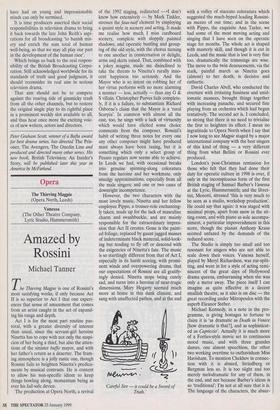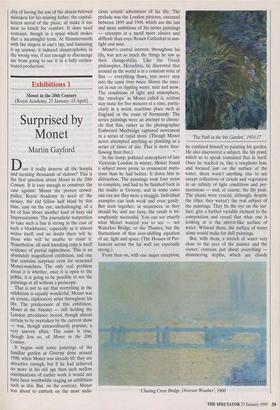Opera
Vanessa (The Other Theatre Company, Lyric Studio, Hammersmith)
Amazed by Rossini
Michael Tanner
The Thieving Magpie is one of Rossini's most satisfying works, if only because Act II is so superior to Act I that one experi- ences that sense of amazement that comes from an artist caught in the act of expand- ing his range and depth.
Act I is for the most part routine pas- toral, with a greater diversity of interest than usual, since the servant-girl heroine Ninetta has to cope with not only the suspi- cion of her being a thief, but also the atten- tions of the sinister buffo mayor, and with her father's return as a deserter. The fram- ing atmosphere is a jolly rustic one, though Rossini fails to heighten Ninetta's predica- ments by musical contrasts. He is content to allow his non-specific idiom to keep things bowling along, momentum being as ever his fail-safe device.
The production at Opera North, a revival of the 1992 staging, redirected don't know how extensively — by Mark Tinkler, stresses the faux-naif element by employing a quaint style in scenery and acting. It made me realise how muck I miss cardboard scenery, complete with sloppily painted shadows; and operatic bustling and group- ing of the old style, with the chorus turning to one another in consternation or delight, arms and skirts raised. That, combined with a jokey magpie, made me disinclined to take the threats to Ninetta's rurally inno- cent happiness too seriously. And the Mayor who is so intent on robbing her of her virtue performs with no more alarming a manner — less, actually — than any G & S villain. Christopher Purves fails complete- ly, if it is a failure, to substantiate Richard Osborne's claim that the Mayor is a 'rural Scarpia'. In common with almost all the cast, too, he sings with a lack of virtuosity which would have elicited some choice comments from the composer. Rossini's habit of writing three notes for every one any other composer might have produced must always have been taxing, but it is something which only a select group of Pesaro regulars now seems able to achieve. In Leeds we had, with occasional breaks into genuine spinning-along coloratura from the heroine and her workmate, only smudgy approximations, especially from all the male singers; and one or two cases of downright incompetence.
However, the two characters with the most lovely music, Ninetta and her fellow employee Pippo, a trouser-role enchanting- ly taken, made up for the lack of masculine charm and swashbuckle, and are mainly responsible for the extraordinary impres- sion that Act II creates. Gone is the paint- ed foliage, replaced by gaunt jagged masses of indeterminate black material, solid-look- ing but tending to fly off or descend with the exigencies of Ninetta's fate. The music is so startlingly different from that of Act I, especially in its harsh scoring, with promi- nent winds and overpowering drums, that our expectations of Rossini are all gratify- ingly denied. Ninetta stops being cutely sad, and turns into a heroine of near-tragic dimensions. Mary Hegarty seemed much more at home in this dank climate, and sang with unaffected pathos, and at the end `Careful Sire — it could be a Sword of Truth.' with a volley of staccato coloratura which suggested the much-hyped leading Rossini- an mezzo of our time; and in the scene with Pippo, the exquisite Ann Taylor, we had some of the most moving acting and singing that I have seen on the operatic stage for months. The whole act is shaped with masterly skill, and though it is cut in Leeds, and the music that is lost is very fine too, dramatically the trimmings are wise. The move to the twin denouements, via the stark, painful march as Ninetta goes (almost) to her death, is decisive and cathartic.
David Charles Abell, who conducted the overture with irritating fussiness and unid- iomatic nuances, brought things together with increasing panache, and secured fine playing from an orchestra which had begun tentatively. The second act is, I concluded, so strong that there is no need to trivialise the first to heighten its effect. I mean no ingratitude to Opera North when I say that I now long to see Magpie staged by a major international company with the best singers of this kind of thing — a very different thing from what Bellini or Rossini ever produced.
London's post-Christmas remission for those who felt that they had done their duty for operatic culture in 1998 is over, if only in the inconspicuous form of the first British staging of Samuel Barber's Vanessa at the Lyric, Hammersmith; and the libret- tist, Menotti, stressed 'this is very much to be seen as a studio, workshop production'. He could say that again: it was staged with minimal props, apart from snow in the sit- ting-room, and with piano as sole accompa- niment, a particular impoverishment in this score, though the pianist Anthony Kraus seemed unfazed by the demands of the reduced score.
The Studio is simply too small and too resonant for singers who are not able to scale down their voices. Vanessa herself, played by Meryl Richardson, was ear-split- ting, and went in for a style of acting remi- niscent of the great days of Hollywood drama queens, embarrassing when she was only a metre away. The piece itself I can imagine as quite effective in a decent smallish theatre, as it also is on disc — the great recording under Mitropoulos with the superb Eleanor Steber.
Michael Kennedy, in a note in the pro- gramme, is giving hostages to fortune to claim it is 'as dramatic as Death in Venice [how dramatic is that?J, and as sophisticat- ed as Capriccio'. Actually it is much more of a Forties-style movie set to continuous mood music, and with three grandes dames, one almost speechless, the other two working overtime to outhavisham Miss Havisham. To mention Chekhov in connec- tion with it. is absurd, Strindberg or Bergman less so. It is too slight and too merely melodramatic for any of them, in the end, and not because Barber's idiom is so 'traditional': I'm not at all sure that it is. The language of the characters, the absur- dity of having the son of the absent beloved mistaken for his missing father, the capital- letters moral of the piece, all make it too near to kitsch for comfort. It does need restraint, though in a space which makes that a meaningful term. At Hammersmith with the singers in one's lap, and hamming it up anyway, it induced claustrophobia in the wrong way, if not enough to discourage me from going to see it in a fully orches- trated production.



























































 Previous page
Previous page